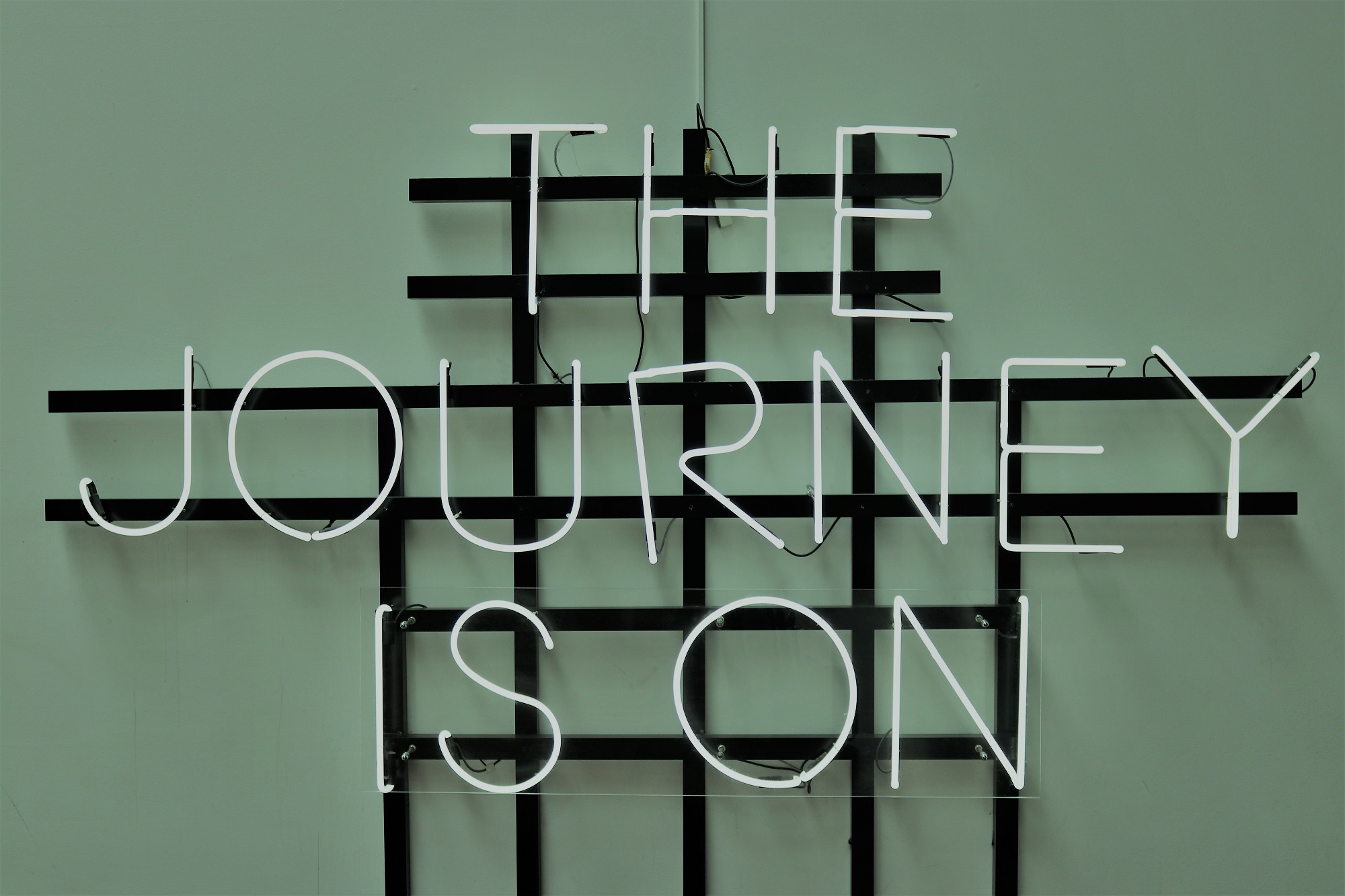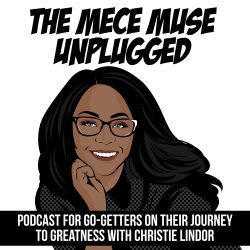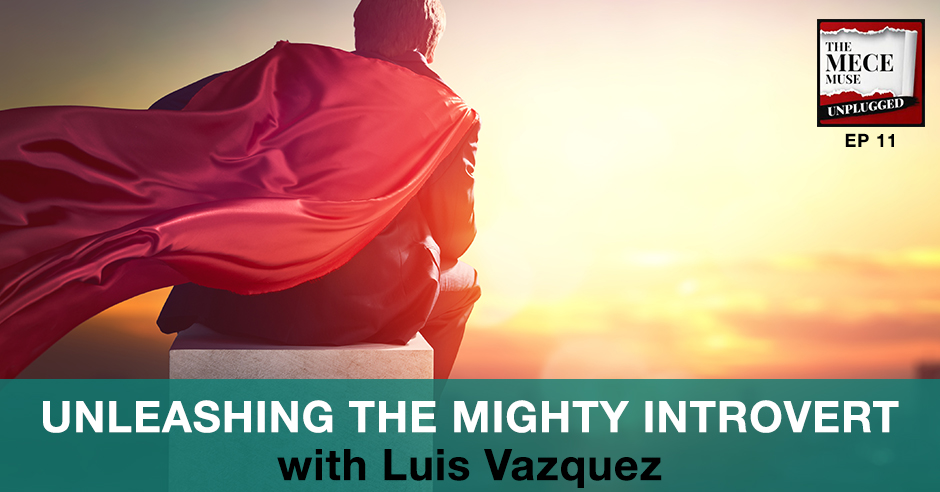In this Quick Wins interview, Luis Vasquez of Mightyintrovert.com shares how he learned to maximize his introversion with a 90%+ success rate of selling new business projects. He offers his proven sales method through an online course, helping introverts discover how to enhance their ability to influence and strengthen client relationships in a way that is authentic to themselves.
Listen to the Episode here:
Podcast: Play in new window | Download | Embed
Subscribe: Apple Podcasts | Email | TuneIn | RSS | More
For this episode, we will be doing a segment that I call Quick Wins. This is our first Quick Wins of this pop-up podcast. With this segment, we look to showcase a product or service that is beneficial for consultants to consider adding to their toolkit on their journey to greatness. With that, I would like to welcome Luis Vazquez of MightyIntrovert.com to the show. Thank you so much for taking the time to join us on the MECE Muse Unplugged. I’m super excited. I think this will be a great conversation. Before we get started with this interview, if you could maybe take a moment to introduce yourself to the go-getters of the MECE Muse Unplugged.
I teach introverted freelancers and consultants how to sell. I do that through writing, speaking, and teaching at MightyIntrovert.com.
I find that it’s such a unique place to be on. What’s interesting about that is I’m introverted by nature. I spent many years trying not to be introverted, because here in the US specifically and consulting, it seems like the values or characteristics that people tend to weigh or give more credibility towards is those of folks that are more outward and more extroverted. I call it sometimes like a Jekyll and Hyde type of thing, where I’m at work and I’m able to flex and become extroverted, and then I go back to my default space. I remember I came across your website on of the social media networks and I was intrigued by it. My first question for you is how did you begin the journey of creating the MightyIntrovert.com and the online course that you have?
Since I was a little boy, I was introverted. Most of the things I’ve done in my life have always been able to be introverted. When I started working in the corporate world, specifically in the consultant role, what happened was I slowly started to have to flex that extroverted muscle, as you mentioned, and before I knew it, I was totally different. I grew up in Mexican culture, so socialization is built into our culture. I know how to flex an extroverted muscle just as you can, but the thing is when I wanted to leave the corporate world and I started my own business, I started freelancing and consulting on my own terms, what happened was I went to sell and I was selling like an extrovert. I was imitating what I thought selling look like in the corporate world, and in reality it mismatched who I was.
There was an inconsistency and I was failing pretty much, and I sold crappy projects. It was not working for me. What I said was, “If I’m going to fail, let me fail in my own style and with dignity, at least with who I am.” What I started doing was I started to shape myself differently. I started making different decisions in my business, and I started making my interactions with my clients in consulting and freelancing very personalized to who I was. What I discovered was that was the key to running my successful business. I started to make more friends, more freelancing, more consulting friends, and they would ask me questions about how did I sell certain types of projects, because I was trying to sell higher-price projects and I thought that everyone had that type of success.
What I did was I started a small newsletter between ten friends and I started writing and writing. What I started to notice was most of the questions that were coming in were more introverted questions. I said I’m going to start teaching introverted freelancers and consultants how to sell. It took a little bit a while, a few months of writing and interacting, but eventually this is where I’ve honed in and I find it very satisfying because my work has everything to do with authenticity and empowering people to be who they are, or if they’re not content with that, giving them courage to change that.
It’s nice to see that you took what folks like myself and probably other introverts out there took as what may be considered something that’s a limiting attribute and you spun it into something positive and impactful to others. I give you kudos. I actually started to take your online course. I haven’t finished it yet, but it has been good because it has helped me reframe and rethink stuff. Can you maybe share with the go getter a little bit about how your online course is structured and how did you come up with that as your entrée to this. Was it feedback from the newsletter? Maybe you could share a little bit of context there.
It was mostly a bunch of questions that most freelancers and consultants had. I started making a list and I would often write content accordingly. Now, after a year writing content of interacting with introverts, I realized what their pain points are in selling. These pain points are throughout the whole sales process. Many introverts, they don’t even understand selling and they have no sales process. I structured the course according to the sales process. It’s just a four-step sales process that happens between every business specifically with consultants and freelancers that they’re phases where if you were to learn how to think about them from an introverted point of view, that you would know how to make better decisions, because everyone’s sales processes differently. The way we persuade people, the way we influence people, it differs from person to person. To learn how to think about every step of that sales process in a way to ask the right questions and then to apply the proven principles that you’re learning and tailor it to who you are, plus your ideal clients, it makes you successful in influencing and persuading overall.
That’s how I structure the free course. This actually was a high-level course, maybe like a briefer course that’s going to lead into an online workshop that I’m creating. In that online workshop, it’s structured from an introvert’s perspective. We’re good at asking questions. We love to ponder on deeper questions and understand things. The online workshop is actually structured from eighteen questions that if you were to answer these eighteen questions, you would become a better salesperson overall and you would find the necessary information, your critical action plans that you would discover how to improve your sales skills, and without sacrificing your introversion or giving up who you are.
Someone maybe hearing this conversation and thinking, “It’s just an online course for freelancers.” I like the word you used, influence, because that’s how I see it. It’s not about the hard sell, and as consultants, it’s about how do we influence, shape, and create solutions and offer them to our clients in a way that is authentic. Your course does a nice job and I’m probably about 75% through it, but for what I’ve seen, it does a nice job of that. It is interesting and I’m actually looking forward to the workshop that you have coming out. I think that’s great as well. How long is the workshop?
I’m structuring it to be a three to four-week workshop, but it’s really in-depth. What you’ll take away from it is like a proven sales process. Again, there are eighteen questions that we’ll discuss and then you’ll answer these questions because every answer is different from person to person. Then you’ll be structuring this sales process. What happens when you give certain questions enough thought, you actually become a different person because your paradigms are shifting.
A lot of people associate their identity with what they do, but in reality what happens is they believe that who they are is because of what they do, but in reality, it’s the other way around. They do the things they do because of who they are. When you do realize that, what happens is we start to become different people when we shift our paradigms, when we grow and understand the world, and we perceive it differently. The goal is to become that person that intuitively can influence others and feel comfortable doing it in their own skin. That’s what the workshop is about. At the end, you have a sales process or practice that’s unique for your consultant business or your firm, and you’ll be able to execute that sales process in a way that feels natural and authentic to yourself.

I’ve almost finished your free online course. I learned a lot about myself as I mentioned. I spend so much time flexing so it’s nice to see something a little bit more authentic to me. I’m looking forward to the workshop. One thing that you’ve mentioned on another interview you did in the past, I was looking it up online and you talked about breaking down introversion by culture. I mentioned I flex a lot, but it’s funny when I say in my natural state, people tend to think that I’m anti-social or I don’t want to talk to them or I may think I’m better than them. It’s nothing like that. It’d be interesting if you can share with our go getters what introversion means to you growing up, because it’s such an interesting perspective.
As I’ve researched introversion, there are things that are scientific and there are things that is just perception. Introversion on a large scale is relative. The story that we tell ourselves about introversion is relative to our culture and to the people we surround ourselves with. I’m a Mexican introvert. A lot of people will say, “You’re not an introvert. No way. You speak for living or you do this stuff,” but I’ll say, “I’m different. I am Mexican introvert. I have five sisters and two brothers. There was not a lot of alone time growing up.” Obviously, I’ve developed more extroverted type of muscles. Introversion, extroversion, it’s a spectrum. We all lie differently within the spectrum. Some of us are more introverted than others, but extroversion, you can learn how to develop skills that are more outgoing or fit an extrovert more. It’s originally same thing. Here in America right now, there’s a craze where within the last five, ten years, America finally discovered that if they sat down and stayed quiet for a little bit, that it’s actually helpful. This is why everyone is trying to meditate.
This is why yoga is so popular. You look at the way they meditate. They started off with ten minutes and then they work up to twenty and then 30 and then sometimes even an hour, but it’s a muscle that they’re developing and we can do the exact same thing. However, with that being said, growing up as a Mexican introvert, when I was little boy, I would play with kids sporadically. Normally these kids would have to come and prompt me to play with them because I preferred being by myself. When my parents, my family, and my culture saw that, that I would be by myself, these kids would come in and try to play with me, I would play back with them, but once I was bored, I would separate myself from the group of kids and play by myself again or be by myself. A few minutes later, these kids would come and prompting me to play again with them. What they perceived was, “Luis is just a natural leader. He just has more Alpha traits naturally.” They never associated my introversion with being passive and with being weak or anti-social. Instead, they told me the story indirectly. They never said it directly, but indirectly, they treated me as more of a leader and as more of a dominant personality type. I grew up with that story in my head, that’s very different from American culture.
American culture, they tell their story indirectly or even directly sometimes that introverts are passive, that they are anti-social, and that they’re weak. They’re the weaker personality type. I’ll tell you a story that I’ve told a few times. I was at this conference in Boise, Idaho. They had this closing party, and I used to be a break dancer, so I did little break dancing. The crowd was cheering, the people were excited. Then this young lady comes up to me and she says, “That was super awesome, but I thought you were an introvert.” I looked at her and I smiled. I said, “I didn’t know introverts didn’t dance.” She realized what she had said; this assumption, this myth.
The thing is that was a moment where someone was indirectly trying to tell me a story about introversion. If you don’t understand your introversion, if you don’t understand who you are, you run the risk of that indirect story affecting and influencing all of the decisions in your life, because when you do want to go do something such as dance because it’s what feels natural at the moment and someone tells you, “I thought you were an introvert,” you can easily start to question your identity. You can easily start to say, “That’s not something I do, so maybe I wasn’t dancing right. Was I dancing awkward?” To understand who you are is very important, and you have the power to tell your story or perceive introversion as a story.
Scientifically, introversion is about how stimulated we feel by our environment. Introverts, we are more sensitive to environments. We’re sensitive to noises, we’re sensitive to interaction, it drains our energy a lot quicker than an extrovert. They are not as stimulated as we are. That’s why they’re always out knowing they’re trying to find that stimulation balance that we naturally get even by being by ourselves. We recharge when we’re by ourselves because it doesn’t take a lot to stimulate us, versus an extrovert needs to be in that constant interaction to be able to recharge. That’s pretty much scientifically what introversion is, but these characteristics, like we don’t dance, we don’t know how to talk, we stutter, we’re passive, there are extroverts who are insecure, there are extroverts who are passive, there are extroverts who stutter. Just tell yourself the right story, it’s very empowering.
Thank you for sharing that story of growing up in a culture. Everything you said is so on point. I think about the newbie consultant or someone straight out of school that may be introverted. I remember when I was coming up, everyone wants to be very outward and open, and I wasn’t like that. Whether it was perceived to not, I felt like that I may have impacted my career in the beginning, so I made sure I built that flex muscle. It’s fine to flex, but it’s also how can you embrace how you are and leverage and operate from that vantage point as opposed to flexing as much as you may think you need to do and not creating that indirect story.
I thank you for sharing that insight. That will be helpful for anyone listening to this that’s introverted and sometimes struggling with that particularly in the American culture. What would you say is one of the common pitfalls you see with introverts that can impede their success? I know with your course, it seems like you’re very interactive. With people that take your course, there’s that feedback loop which is great. What are some of the common threads you see as people are trying to figure out what their introversion mean and how to leverage it?
The most common that I see and probably the most important one to address, whether an introvert wants to admit it or not, is a lack of confidence. A lot of introverts don’t do things because of a lack of confidence. It’s not even only introverts, but even consultants, everyone, it’s just by understanding things better and by asking the right questions. Once you understand, you get that information that you understand to become more confident in applying it or even doing or applying the information or implementing it. We’re all in sales whether we like it or not, consultants especially, since they’re constantly interacting with clients and they need to convince someone that this is the best strategy, that this is the best way to go for you to get the results that you’re aiming to achieve. Our friends are in sales too.
Anytime someone says, “Have you watched this movie? It’s a good show or good movie. You should watch this on Netflix.” That was a quick sale. The late Zig Ziglar has the best definition of selling by far. He defined selling as a transference of emotion. We’re always transferring emotion. That’s what we call influence to a certain degree. Here’s the thing with consulting and with introversion, is that if you lack confidence, guess what emotions you’re transferring? Guess what you’re selling. You’re selling insecurity, you’re selling a lack of confidence, and nobody wants to buy a lack of confidence.
Nobody wants to do business with insecurity. It should be confidence in what you do and to have a reason why you do it will give you that confidence. It will help you influence and persuade people much better and just realize, “The way I transfer emotion is very different from the way Christie transfers emotion.” I don’t have to try to imitate her. I can do it in my own style and fashion, whatever feels natural to me. I believe that that’s the most common pitfall, is that a lot of people are doing things that they don’t understand. They don’t have a good reason why they’re doing it, it’s just the norm. It’s the tactic that someone else was using. It’s having a good understanding and a good reason on why you’re doing the things you’re doing will help you persuade and influence and sell better because you’ll have that confidence to do it.
For the last part of the show, I want to slightly pivot. I want to go back to authenticity. I know that’s important to you. You mentioned break dancing. I’m fascinated by the combination. You’re a writer, you’re a speaker, you’re a teacher, and you’re a break dancer. How did that come about? Just a quick spill if you can just share with our audience.
I started break dancing when I was eighteen. It happened by accident. I’ve always been stimulated by challenges and if there is a challenge ahead of me, I am focused since I was a little boy. Break dancing was one of those things. To push my body to the limits, to learn how to dance and then to compete and do shows. I’ve done shows for the NBA. I traveled and competed, but what I learned in break dancing was the power of authenticity. Every dancer is unique and different. The next time you see a group of dancers, this is what I want you to do. I want you to pay attention to the best dancer in that group. They’re doing the same routine, the same song, sometimes even wearing the same shoes and clothes, yet one of them looks better than the other. One of them stands out.
Have you ever asked yourself why someone looks better even though the movements are the same? Everything, the same mechanics, everything. Everything has to do with authenticity. The reason that that dancer is better and stands out is because she is staying true to who she is. She understands the way her body naturally moves, and so the way she commits to the routine is on an entirely different level because it’s a natural way and that’s an authentic way. Her movements are more fluid, are more in control, and that’s what makes you a better dancer.
I discovered this when I used to travel and compete. I discovered that only because I was like a year or two into breakdancing, sometimes I was competing against people that were five or ten years in break dancing. They had better moves, they have better skills, just more experience overall, but I could beat them if I stood a chance, a better chance of beating them, and sometimes I did, if I was more authentic than they were. While they were doing flashy tricks and blow ups and stuff like that, I was simply dancing in the best way that I know how to dance, in a natural way. I was in tune with the music, and therefore the judges who were experienced dancers understood this guy is a better dancer.
Therefore, I would win, and I would actually beat people. I beat my competition. It’s the same thing in consulting and it’s the same thing in business, is that if you wrapped your business and your consulting in authenticity, you will naturally stand out every time better and more than the next consultants that’s just going through the motions, trying to be flashy or tricky. They always want to stand out. Authenticity is so crucial in our lives, but also in business.

With any type of performance, there is that one or two people that stand out. In the past, up until this conversation, I used to chalk it up as, “You know how some people just have the it factor?” They have the gene se quoi. I used to chalk it up to something like that, but now that you say that, it makes sense, so thank you for bringing that to light. That was helpful.
They’re transferring emotion. That’s why you feel it. That’s why you notice it. We’re selling too. We’re selling a performance and experience.
This actually wraps up this episode. I just want to give you a moment if you have any parting remarks to our go getters on how to be a great consultant, particularly if you are introvert. What’s the one partying takeaway that you have?
If you want to succeed as a consultant, be sure to have a clear understanding of three things. Have a clear understanding and make a decision about who you are, have a clear understanding and make a decision about who your ideal clients are or the people that you’re working or serving, and then have a clear understanding and make a decision on what selling is and how that looks for you. You’ll be set, because that’s where you’re going to make a difference. You can have a clear understanding, and train your decisions according to those three things, you’re going to be okay when it comes to consulting.
Thank you so much, Luis, for joining us. Maybe you can share your contact information, how should people get in contact with you if they’re interested in connecting?
They can catch me at MightyIntrovert.com. Most of my social media handles are @LuisCreates. I’m on Instagram, Twitter, and then you could probably find me on LinkedIn too.
Thank you so much Luis. This is such a great conversation. I appreciate you coming and being a guest on this show.
Thank you for having me.
Go-getters, if you have a question or feedback, feel free to drop us a line at MECEMuseUnplugged@Gmail.com. I would like to thank our guest for being on the show and thank you my go getters for tuning in. This is Christie Lindor signing out for the MECE Muse Unplugged Popup podcast.
Thank you for listening. I hope you enjoyed this episode. This pop-up podcast was inspired by my book The MECE Muse: 100+ Selected Practices, Unwritten Rules, and Habits of Great Consultants. I have people asking me many questions about this book, but the one question that comes up constantly is, “Christie, you have such a demanding career. How did you find time to write this book?” Honestly the answer is simple. I fought to become the mentor that I wish I had earlier in my career. In the beginning of my career, I didn’t have many mentors and mental maps of what success looks like, and I struggled with that in a lot of different ways. What’s nice about struggles is that I overcame them. I grew stronger and more competent, and I’m so excited where I am in my career. I want to share what I’ve learned and be able to help you.
I wrote the book with my years of experience, but I also had an amazing opportunity to connect with over 50 or so consulting partners and leaders across the industry, sharing their stories, their antidotes, and their resources on how you could be a great consultant yourself. Do me a favor. Pick up your phone right now. Go to www.MECEMuse.com. I’d love to hear your feedback on my book as well as the podcast. Thanks again for listening, and here’s to your journey to greatness.
Links from the episode:
- MightyIntrovert.com
- Luis’ Instagram
- Luis’ Twitter
- Luis’ LinkedIn


